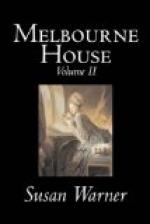Hamilton, with a glance at the picture, went behind Preston; and putting on a savage expression, thrust his clenched fist out threateningly towards the dignified figure of Frederica; while Theresa, stealing up into the group, put her hands upon a chair back to steady herself and bent towards the queen a look of mournful sympathy and reverence, that in the veritable scene and time represented would undoubtedly have cost the young lady her life. The performers were good; the picture was admirable. There was hardly anybody left to look when George Linwood and Alexander had taken post as the queen’s guards; and to say truth they did not in their present state of undisguised individuality add much to the effect; but Mrs. Sandford declared the tableau was very fine, and could be made perfect.
The question of Cinderella came up then; and there was a good deal of talk. Finally it was decided that little Ella should be Cinderella, and Eloise the fairy godmother, and Jane Linwood and Nora the wicked sisters. A little practising was tried, to get them in order. Then Esther was called for. Daisy submitted.
Hamilton Rush was made magnificent and kingly by a superb velvet mantle and turbaned crown—the latter not perfect, but improvised for the occasion. For a sceptre he held out a long wooden ruler this time; but Preston promised a better one should be provided. The wooden ruler was certainly not quite in keeping with the king’s state, or the queen’s. Daisy was robed in a white satin dress of her mother’s; much too long, of course, but that added to the rich effect; it lay in folds upon the floor. Her head was covered with a rose-coloured silken scarf wound artistically round it and the ends floating away; and upon this drapery diamonds were bound, that sparkled very regally over Daisy’s forehead. But this was only the beginning. A zone of brilliants at her waist made the white satin dazzling and gathered its folds together; bracelets of every colour and of great beauty loaded Daisy’s little arms; till she was, what Mrs. Sandford had said Esther must be, a spot of brilliancy. Her two maids, Nora and Jane Linwood, at this time were not robed in any other than their ordinary attire; perhaps that was one reason why their maintenance of their characters was not quite so perfect as that of the principal two. Hamilton stretched forward his wooden sceptre to the queen with benignant haste and dignity. Daisy, only too glad to shrink away, closed her eyes and lay back in the arms of her attendants in a manner that was really very satisfactory. But the attendants themselves were not in order.
“Jane, you must not laugh—” said her brother.
“I ain’t laughing!”
“Yes, but you were.”
“The queen is fainting, you know,” said Mrs. Sandford. “You are one of her maids, and you are very much distressed about it.”
“I am not distressed a bit. I don’t care.”
“Nora, do not forget that you are another attendant. Your business is with your mistress. You must be looking into her face, to see if she is really faint or if you can perceive signs of mending. You must look very anxious.”




